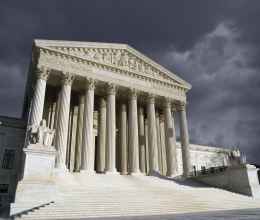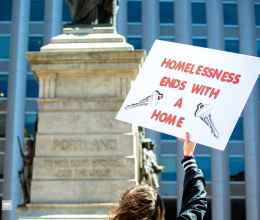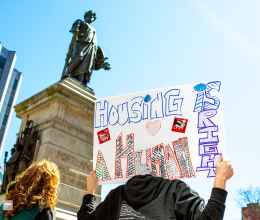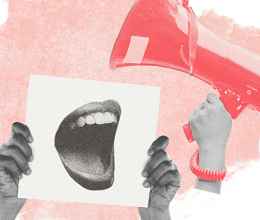Testimony to the Portland City Council
by Emma Bond, Legal Director, ACLU of Maine
My name is Emma Bond, and I am a resident of Portland and the Legal Director at the ACLU of Maine, a statewide organization committed to advancing and preserving civil liberties in Maine. I write to amplify the demands of the protesters at the City Hall encampment and urge you to act on their demands.
We are in the midst of the COVID-19 pandemic and the opioid epidemic, both of which have disproportionately affected unhoused people — a population that could increase dramatically in the weeks and months to come. Maine’s eviction freeze ended last week. On top of that, unemployment remains high and the expanded $600 unemployment benefit has ended. Rent is due and, despite recent increases in a statewide rental assistance program, many people will struggle to make their payments. We have to be prepared for the possibility that a wave of evictions will descend on us. The solutions the Council adopts now will impact those who lose their homes in the coming weeks and months. In this time of great need, it is critical that the Council get it right.
As the City Council deliberates on the issues raised by the protesters, we ask that it keep in mind the following points: (1) homelessness is a racial and gender justice issue; (2) homelessness and racism are public health emergencies that require investment in housing, treatment, and services—not segregation and criminalization; and (3) punishing people for sleeping outside or silencing protests carries serious constitutional concerns. All of these considerations require centering impacted voices in fashioning solutions to the overlapping crises of COVID-19, racism, sexism, and homelessness.
I. Homelessness Is a Racial and Gender Justice Issue
The City Council must recognize that homelessness is a racial justice issue. Despite the fact that Black people represent less than 1.5 percent of Maine’s population, “26 percent of homeless individuals [in Maine] were Black or African-American or mixed-race, and 33 percent . . . were minorities.”1 This disparity intersects with the disproportionate risk of infection and death facing people of color during the COVID-19 pandemic. Indeed, Maine has the terrible distinction of having the nation’s worst COVID-19 racial disparity.2
Moreover, homelessness imposes special burdens on women, especially women of color, who constitute a disproportionate share of renters. The gender wage gap and women’s vastly disproportionate share of student and other forms of debt mean that women are less likely to own homes, and more likely to be renters. The intersection with race only compounds these issues. In the words of Matthew Desmond, author of Evicted, “Poor black men [are] locked up. Poor black women [are] locked out.” Eviction exposes women to greater risks of harassment, sexual assault, and homelessness. Accordingly, in responding to the crisis of homelessness, the City Council must stand by its recent proclamation against racism and its promise to “engage our communities to address and uproot institutionalized racism and implicit bias.”3
II. The City Must Stop Criminalizing Poverty, and Instead Invest in Housing, Treatment, and Services
Criminalization of homelessness only worsens disparities in COVID-19 infections by unnecessarily exposing people to the risks of infection in jail. Yet overpolicing remains common. Despite early warning about the dangers of spreading infection between homeless shelters and the jails, the police have continued to arrest and incarcerate unhoused individuals for minor and non- dangerous offenses like drinking in public or trespass. Even during the Council’s meeting on July 27, two police officers tackled a man outside City Hall on the ground, one officer standing guard, and additional officers in two police cars standing by. This man’s crime? Smoking a cigarette.
Decades of experience also show that criminalization of substance use disorders solves nothing and only makes people less likely to seek treatment. At the July 27 City Council meeting, Portland’s Fire Chief said people in encampments are reluctant to come forward in cases of overdose. Given the excessive policing and criminalization of unhoused people, that should come as no surprise.
Efforts to corral people back into enclosed spaces in the Bayside neighborhood — away from wide-open public parks and public spaces — smack of segregation and isolation of people with disabilities and people of color. Investment in truly affordable housing, treatment for substance use disorders, and harm reduction is the only path forward. Relying on the police only makes the problem worse and diverts necessary resources away from treatment and housing.
III. Criminalization of Homelessness and Suppression of Unpopular Speech Are Unconstitutional
The City’s treatment of unhoused people and protesters also raises significant constitutional concerns. The criminalization of public camping is unconstitutional when shelter is not available — whether because the shelters are full, have time limits, expose people to the risk of infection, or condition access on compliance with onerous rules. “[A]n ordinance violates the Eighth Amendment insofar as it imposes criminal sanctions against homeless individuals for sleeping outdoors, on public property, when no alternative shelter is available to them.” Martin v. City of Boise, 920 F.3d 584, 604 (9th Cir. 2019), cert. denied sub nom. City of Boise, Idaho v. Martin, 140 S. Ct. 674, 205 L. Ed. 2d 438 (2019).4 Punishing people for the involuntary act of being homeless is cruel and unusual punishment.
Although Portland shelters are currently operating below full capacity, many people have been turned away, including through the issuance of no trespass orders and imposition of onerous rules. The City has not shown that alternative shelter is meaningfully available to everyone who is sleeping in Deering Oaks or in front of City Hall. Nor has the City shown that breaking up encampments is consistent with CDC guidance regarding safety precautions for COVID-19.5 Absent such showings, punishing people for sleeping outside carries serious constitutional concerns. At this time of crisis — when governmental support and resources are more important than ever — the City Council should not risk coming anywhere close to this constitutional line.
Finally, protesters also have a First Amendment right to express their views in public spaces. In the prior protests for Occupy Maine, City officials affirmatively offered the use of Lincoln Park for overnight stays (on October 2, 2011), and approved the use of “Porta-Restrooms” at the protest. It took nearly two months for the City to attempt to enforce any permit requirement for overnight stays. To the extent the City takes a different approach here, concerns may be raised that the new approach stems from discomfort with the protesters’ message. Shutting down protest would also raise questions about whether the City’s response is narrowly tailored, and whether the City has ensured adequate alternative channels for the protesters to communicate their message. This is a time to listen to the needs of an impacted group, not to silence them.
Conclusion
The City should listen to the demands of the protesters at the City Hall, and allow the protests to continue. Please feel free to reach out with any questions. My colleagues and I are always available to talk. Thank you for your time and attention.
Footnotes
1. Bianca Santiago, Jon Bradley, and Thomas Chalmers Mclaughlin, Maine Voices: Homelessness is a racial justice issue in Maine, too, Portland Press Herald (July 10, 2020), available at https://www.pressherald.com/2020/07/10/maine-voices-homelessness-is-a-ra... maine-too/ (citations omitted).
2. Kevin Miller, Maine has nation’s worst COVID-19 racial disparity, Portland Press Herald (June 21, 2020), available at https://www.pressherald.com/2020/06/21/maine-has-nations-worst-covid-19-... disparity/.
3. PROCLAMATION CONDEMNING RACISM AND HONORING AHMAUD ARBERY, BREONNA TAYLOR, AND
GEORGE FLOYD, Portland City Council (June 1, 2020), available at http://portlandmaine.gov/CivicAlerts.aspx?AID=4972.
4. See also Jones v. City of Los Angeles, 444 F.3d 1118, 1132 (9th Cir. 2006), vacated after settlement, 505 F.3d 1006 (enjoining ordinance that punished conduct which was “an unavoidable consequence of being human and homeless ... in the City of Los Angeles”); Pottinger v. City of Miami, 810 F. Supp. 1551, 1553 (S.D. Fla. 1992) (enjoining “custom, practice and policy of arresting, harassing and otherwise interfering with homeless people for engaging in basic activities of daily life ... in the public places where they are forced to live”).
5. Interim Guidance on People Experiencing Unsheltered Homelessness, U.S. Centers for Disease Control and Prevention (May 13, 2020), https://www.cdc.gov/coronavirus/2019- ncov/community/homeless-shelters/unsheltered-homelessness.html (“Clearing encampments can cause people to disperse throughout the community and break connections with service providers. This increases the potential for infectious disease spread.”).







